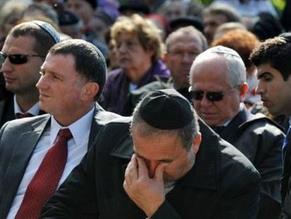|
World Jewish News

Israeli Foreign Minister Avigdor Lieberman (C) reacts as he attends the 70th memorial ceremony tribute to victims of the 1941 Nazi massacre of Jews at the Babi Yar ravine in Kiev, on October 3, 2011. Photo: Sergei Supinsky in Kiev, AFP Copyright 2011
|
Ukraine marks 70 years since Babi Yar massacre of Jews
04.10.2011, Holocaust Top Ukrainian and Israeli officials paid tribute Monday to tens of thousands of Jews shot by the Nazis in Kiev 70 years ago in one of the Holocaust's deadliest massacres.
The Nazis murdered 33,771 Jews at Babi Yar ravine in the capital Kiev between September 29-30, 1941 in an atrocity that has only been properly commemorated in recent years.
The massacre marked the start of Ukraine’s Holocaust in which a pre-war Jewish population of about 1.5 million was virtually wiped out to fulfill Adolf Hitler’s ambition of a Jew-free Europe. Gypsies, Russians and Ukrainians were later executed in the ravine as well.
Similar mass killings took place across Ukraine, Belarus and other neighboring countries such as Romania.
“What happened here [in Ukraine] served as a prototype of contemporary genocide,” said Patrick Desbois, a French Catholic priest who visited Ukraine this month with a grim exhibition called Holocaust by Bullets.
Ukrainian President Viktor Yanukovych, accompanied by Prime Minister Mykola Azarov and Israeli Foreign Minister Avigdor Lieberman, on Monday placed flowers at the monument to the victims and honoured their memory with a minute of silence.
"It is difficult to fully comprehend the events that occurred in Babi Yar. It is difficult to find the words to express all the depth of our condolences and sorrow," the president said in comments released ahead of the ceremony.
"More and more, time is increasing our distance from these horrible events. But the memory is alive," Yanukovych added.
Shortly after Nazi forces pushed the Soviet authorities out of Kiev in 1941 and occupied the city, they ordered its entire remaining Jewish population to assemble on the pretext of being resettled.
The Nazi occupiers blamed the Jews of Kiev for a sequence of explosions that in fact had been set off by remaining agents of the Soviet NKVD or were time bombs left by the Red Army before their departure.
The resettlement story was a carefully-hidden lie. The Nazis marched the Jews to the Babi Yar ravine on the outskirts of the city where they were shot dead.
The massacre was the subject of the revered early 1960s 13th Symphony of Soviet composer Dmitry Shostakovich who set to music the poem "Babi Yar" by Yevgeny Yevtushenko.
As well as the worst shooting massacre of the Holocaust by the Nazis -- who would largely carry out the final solution with gas chambers -- the massacre was also the first major wartime extermination of the Jews from a major city.
The Nazis used Babi Yar as an execution site until they quit Kiev in 1943.
At least 100,000 more Jews, Roma, resistance fighters and Soviet prisoners were executed although the exact figure remains the subject of debate.
The Babi Yar massacre was played down by the post-war Soviet Union, which was keen not to allow the suffering of the Jews to interfere with the authorities' assertion that the Soviet people had been the main victims of the war.
A memorial put up in 1976 did not mention the Jews. The authorities only allowed a memorial to the murdered Jews to be built in 1991.
"At Babi Yar there are no monuments/ A great cliff like a rough headstone," are the incendiary first lines to Yevtushenko's poem.
Even in 2009, a public and international outcry forced the mayor of Kiev to block a plan to build at the site a hotel that would house visiting football fans for the Euro 2012 football championships.
EJP
|
|
